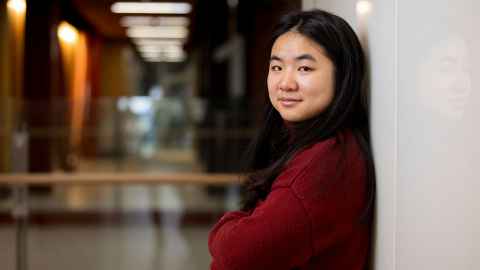Xingyu Wang
Xingyu Wang is developing environmentally friendly chemical catalysts with the help of AI.

Born and raised in China, Xingyu Wang completed her undergraduate studies at Sichuan University and moved to New Zealand to complete a PhD in the application of machine learning in chemistry.
Using Artificial intelligence in her research enables her to streamline what would otherwise be a time-intensive task to develop safer chemical catalysts for the environment.
Xingyu is excited about finding a direction that interests her and where her research might take her, embracing the challenge of the unpredictable and unknown in her work. She hopes to secure a postdoctoral position within a group that aligns with her interests.
Tell us about your research
My work aims to develop highly efficient, selective, eco-friendly catalysts to produce commercially valuable chemicals like methanol. In the field of electrocatalysis, a catalyst is a substance that increases the rate of an electrochemical reaction without being consumed in the process.
Environmentally friendly catalysts are considered green and sustainable because they are abundant, cost-effective, easy to recycle and reuse, and have minimal environmental impact. By reducing reliance on precious and rare metals, we help decrease environmental pollution and provide significant support for developing green chemistry and sustainable energy.
Can you explain how you use AI in your research?
A simple application of AI involves handling the vast volume of literature that is impractical for manual review. We employ large language models to extract data from numerous articles efficiently. This extracted information can quickly enhance our knowledge base or serve as descriptors in traditional machine-learning models for predicting catalyst behaviours and experimental conditions.
Manual experimentation (without implementing AI) incurs significant costs in terms of both resources and safety, and precise theoretical calculations consume excessive computational resources. This is where machine learning comes in. To streamline the process, we use AI modelling, which significantly accelerates the discovery of effective catalysts.
What is the AI system you use for your research?
Because my current research involves using information from a large volume of literature to design experiments, we use open-source large language models similar to GPT-4 (though GPT-4 is a closed-source commercial software). We deploy these open-source models locally, running them on an A100 GPU. During use, we input literature and prompts into the local LLM to extract knowledge from the literature according to our requirements.
What do you like most about the programme and why?
I particularly enjoy the unpredictability and the challenges this project brings.
While the unknown can be risky, it also adds excitement. Moreover, it can assist many chemistry beginners, which I find fascinating.
Where do you hope this qualification will lead you?
I hope to continue my research by pursuing a postdoctoral position or finding a faculty position. Post-graduation, I plan to continue my research in electrocatalysis. Artificial intelligence will remain a valuable tool to expedite my studies, although it is not the primary scientific challenge I intend to address.
Have there been any significant challenges that AI has helped you overcome?
I feel that GPT-4 has helped me a lot. For instance, when I’m studying unfamiliar fields, it acts like a teacher, always providing me with suitable answers.
What excites you most about artificial intelligence?
It can streamline processes quickly, saving manpower and allowing us to avoid repetitive tasks so we can focus our energy on more valuable areas.
Finally, tell us something about yourself that we can’t learn by Googling you.
I love puzzles and building blocks. When I engage in these activities daily, I feel a sense of pleasure, which relaxes me tremendously.
We're always looking for stories to share from our passionate Science students. If you have a story, we'd love to hear from you. Email science-web@auckland.ac.nz.
This story first appeared in InSCight 2024. Read more InScight stories.